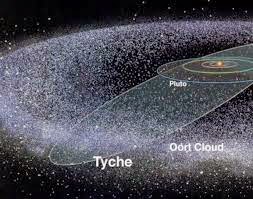Kalava's contribution is crucial at the climax of Poul Anderson's
Genesis (New York, 2001). Without his arrival on Mount Mindhome, Gaia, having changed Brannock's memories, would have successfully concealed her Frankenstein experiment from Wayfarer. By "Frankenstein experiment," I mean, of course, the creation of human life, not the making of monsters, although the former includes the latter.
Mary Shelley wrote the first modern science fiction novel,
Frankenstein, or
The Modern Prometheus. The role of science and whether it can or should be used not only to control but even to create life is clearly a consistent theme from
Frankenstein to
Genesis. (And Frankenstein's monster identifies with the Miltonic Adam who is an epic elaboration of the Adam in the Biblical
Genesis.)
Brannock had advised Kalava:
"'Think of [Gaia] as a sorceress who deceives [Wayfarer] with clever talk, with songs and illusions, while her agents go about in the world.'" (p. 211)
Brannock is not lying. That is the most accurate description of Gaia that he can give in Kalava's language and it serves for practical purposes. Brannock continues:
"'My word will show him what the truth is.'" (
ibid.)
That is the point. To get Brannock's word to Wayfarer, which Kalava does. Since Kalava is living inside a fantasy "Quest," we might wonder whether something like the real relationship between Wayfarer and Gaia could be the truth behind other stories of gods, heroes and sorcerers?
Brannock, after hesitating, describes Mindhome to Kalava and his companions as "'...a holy mountain in the north.'" (p. 203) The mountain has not as yet been revered by the new human race, who have not even known of it until now, but, again, this is the most appropriate description. When Kalava reaches the summit above the clouds, he thinks:
"Brannock had related truth...Upon it stood the demons - or the gods - and their works." (p. 237)
There are shapes that a twenty first century man might not recognize as buildings or machines: a rainbow, webs, nets, "...ashimmer, aripple, apulse..." (
ibid.)
"Ilyandi had said Brannock was of the gods whom she served, her star-gods..." (
ibid.)
At this stage of social development, there is not as yet any differentiation to be made between an astronomer and a star-god worshiper. But the astronomy is real. Brannock reflects:
"...the woman Ilyandi had an excellent knowledge of naked-eye astronomy. Given the rarity of clear skies, that meant many lifetimes of patient observation, record-keeping, and logic, which must include mathematics comparable to Euclid's." (p. 210)
I could not do it. I am a philosopher, not an empirical scientist. But this is why knowledge is specialized. There are powerful intelligences at some of the stars. They do not need Ilyandi's service but their quest for knowledge is also hers.
Laurinda leaves Gaia and accompanies Christian in Wayfarer back to Alpha where we are told that they will live only as memories:
"...what they were will be together, as one, and will live on, unforgotten." (p. 248)
Never forgotten? Real post-cosmic stuff? (p. 107) The galactic brain is only in its infancy (p. 101). Later, it will be able to do better for its human uploads, to give them holidays in emulations like that Surrey estate but without the moral problem of emulated underpaid servants:
"Gaia lacked both the data and the capability necessary to model the entire universe...Powers of that order lay immensely far in the future, if they would ever be realized." (p. 145)
But, given all time, knowledge and energy, why not?
What will the other nodes do about Gaia's new human race? Neither exterminate it nor round it up into a reservation. With their greater resources, they will be able to make a better job of what Gaia has already been doing: discretely guide individuals so that society can be helped towards a stable high technology civilization able to escape from the expanding Sun.
Gaia does not want Arctica colonized yet because human nearness to her physical centrum would lead to:
"'Chaos. The unforeseeable, the uncontrollable.'" (p. 242)
This is ironic because, as Wayfarer reminds her, she is loosing chaos by recreating humanity. And, in Poul Anderson's fiction, it is those who prefer foreseeability and controllability to chaos who are clearly making the wrong choice.
Genesis:
connects back to
Frankenstein and to Olaf Stapledon's
Star Maker;
is a culmination of a sequence of American future histories - the Future History, the Psychotechnic History, the Technic History, the Harvest of Stars tetralogy;
is at the same time a fresh work, not a mere copy or repetition of any of its predecessors;
ends a billion years in the future with the galactic brain in its infancy and a new human race colonizing the Arctican continent.









































